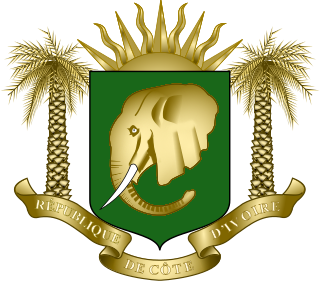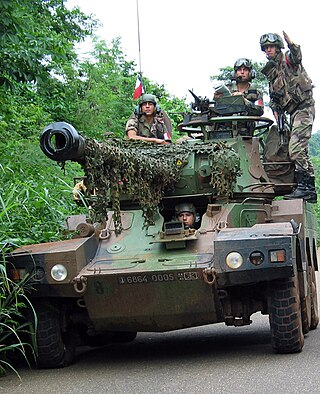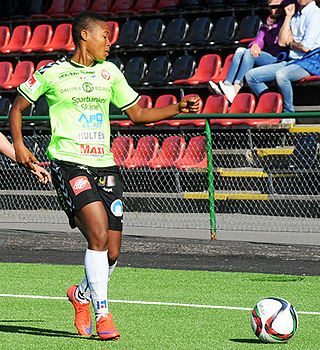Contents
This article's factual accuracy may be compromised due to out-of-date information.(May 2013) |

This is a list of newspapers in Ivory Coast .
This article's factual accuracy may be compromised due to out-of-date information.(May 2013) |

This is a list of newspapers in Ivory Coast .
| Newspaper | Location | First issued | Publisher | Website | Notes |
|---|---|---|---|---|---|
| Actuel [1] | Abidjan | ||||
| L'Aurore [1] | Abidjan | ||||
| La Bombe [1] | Abidjan | ||||
| Le Démocrate | Abidjan | ||||
| Douze [1] | Abidjan | ||||
| Fraternité Matin [2] | Abidjan | 1964 | |||
| Le Front [3] | Abidjan | ||||
| Gbich [4] | Abidjan | Website | |||
| L'Inter [1] | Abidjan | ||||
| Le JD [1] | Abidjan | ||||
| Le Jour [1] | Abidjan | ||||
| Le Liberal [1] | Abidjan | ||||
| Le National [1] | Abidjan | ||||
| Notre Chance [1] | Abidjan | ||||
| Notre Voie [2] | 1991 | Website | |||
| Le Nouveau Reveil [2] | Abidjan | ||||
| Le Patriote [2] | Abidjan | ||||
| Le Populaire [1] | Abidjan | ||||
| Soir Info [2] | Abidjan | ||||
| Tassouman [1] | Abidjan | ||||
| La Voie [1] | Abidjan | ||||

The Armed Forces of Côte d'Ivoire are the armed forces of Ivory Coast.

Ivory Coast, also known as Côte d'Ivoire, officially the Republic of Côte d'Ivoire, is a country on the southern coast of West Africa. Its capital is Yamoussoukro, in the centre of the country, while its largest city and economic centre is the port city of Abidjan. It borders Guinea to the northwest, Liberia to the west, Mali to the northwest, Burkina Faso to the northeast, Ghana to the east, and the Gulf of Guinea to the south. Its official language is French, and indigenous languages are also widely used, including Bété, Baoulé, Dioula, Dan, Anyin, and Cebaara Senufo. In total, there are around 78 different languages spoken in Ivory Coast. The country has a religiously diverse population, including numerous followers of Christianity, Islam, and indigenous faiths.

Koudou Laurent Gbagbo is an Ivorian politician who was the President of Côte d'Ivoire from 2000 until his arrest in April 2011. A historian, Gbagbo was imprisoned in the early 1970s and again in the early 1990s, and he lived in exile in France during much of the 1980s as a result of his union activism. Gbagbo founded the Ivorian Popular Front (FPI) in 1982 and ran unsuccessfully for president against Félix Houphouët-Boigny at the start of multi-party politics in 1990. He won a seat in the National Assembly of Côte d'Ivoire in 1990.
The First Ivorian Civil War was a civil conflict in the Ivory Coast that began with a military rebellion on 19 September 2002 and ended with a peace agreement on 4 March 2007. The conflict pitted the government of Ivorian President Laurent Gbagbo against a domestic insurgency led by the New Forces of Ivory Coast.

Alassane Dramane Ouattara is an Ivorian politician who has been President of Ivory Coast since 2010. An economist by profession, Ouattara worked for the International Monetary Fund (IMF) and the Central Bank of West African States, and he was the Prime Minister of Côte d'Ivoire from November 1990 to December 1993, appointed to that post by President Félix Houphouët-Boigny. Ouattara became the President of the Rally of the Republicans (RDR), an Ivorian political party, in 1999.

The United Nations Operation in Côte d'Ivoire (UNOCI) was a UN-NATO peacekeeping mission in Ivory Coast whose objective was "to facilitate the implementation by the Ivorian parties of the peace agreement signed by them in January 2003". The two main Ivorian parties were the Ivorian Government forces who controlled the south of the country, and the New Forces, who controlled the north. The UNOCI mission aimed to control a "zone of confidence" across the centre of the country separating the two parties. The Head of Mission and Special Representative of the Secretary-General was Aïchatou Mindaoudou Souleymane from Niger. She succeeded Bert Koenders from the Netherlands in 2013, who himself succeeded Choi Young-jin from South Korea in 2011. The mission officially ended on 30 June 2017.

Guillaume Kigbafori Soro is an Ivorian politician who was the Prime Minister of Côte d'Ivoire from April 2007 to March 2012. Prior to his service as Prime Minister, Soro led the Patriotic Movement of Côte d'Ivoire, and later the New Forces as its Secretary-General. In March 2012, Soro became President of the National Assembly of Côte d'Ivoire. He stepped down from that position in February 2019, announcing in June 2019 that he is running to succeed President Alassane Ouattara.

Throughout the Cold War, Ivory Coast's foreign policy was generally favorable toward the West. In particular, Félix Houphouët-Boigny kept relations with France that was among the closest between any African country and a former colonial power. The country became a member of the United Nations at independence in 1960 and participates in most of its specialized agencies. It is also an associate member of the European Union. In general, President Bédié initiated and maintained relations with many countries of the European Union and Asia. Ivory Coast maintains a wide variety of diplomatic contacts.

The following outline is provided as an overview of and topical guide to Ivory Coast:

Abidjan is the economic capital of the Ivory Coast. As of the 2021 census, Abidjan's population was 6.3 million, which is 21.5 percent of overall population of the country, making it the sixth most populous city proper in Africa, after Lagos, Cairo, Kinshasa, Dar es Salaam, and Johannesburg. A cultural crossroads of West Africa, Abidjan is characterised by a high level of industrialisation and urbanisation. It also is one of the most populous French-speaking cities in Africa.
Mass media in Ivory Coast is controlled by the government. Audiovisual communications are regulated by the Conseil national de la communication audiovisuelle (CNCA), an administrative arm of the national government.

United Nations Security Council resolution 1572, adopted unanimously on 15 November 2004, after recalling Resolution 1528 (2004) on the situation in Côte d'Ivoire, the council imposed an arms embargo on the country following recent violence and threatened further sanctions if Ivorian parties did not comply with their political commitments.

The 2010–11 Ivorian crisis was a political crisis in Ivory Coast which began after Laurent Gbagbo, the President of Ivory Coast since 2000, was proclaimed the winner of the Ivorian election of 2010, the first election in the country in 10 years. The opposition candidate, Alassane Ouattara, and a number of countries, organisations and leaders worldwide claimed Ouattara had won the election. After months of attempted negotiation and sporadic violence, the crisis entered a decisive stage as Ouattara's forces began a military offensive in which they quickly gained control of most of the country and besieged key targets in Abidjan, the country's largest city. At the time, international organizations reported numerous human rights violations, and the UN undertook its own military action with the stated objective to protect itself and civilians.
The Ivory Coast women's national football team represents Ivory Coast in international women's football and is controlled by the Ivorian Football Federation. They played their first international match in 1988. The team is currently ranked 64th in the FIFA Women's World Rankings and as the 6th best team in CAF.
Air Côte d'Ivoire is the flag carrier of Ivory Coast, based in Abidjan. The company succeeded the country's former flag carrier Air Ivoire, which went bankrupt in 2011. It started operations on 12 November 2012.
The following is a timeline of the history of the city of Abidjan, Ivory Coast.

Ida Rebecca Guehai, known as Rebecca Guehai, is an Ivorian professional footballer who plays as a midfielder or forward for Spanish club EDF Logroño and the Ivory Coast women's national team.
Annotated directory